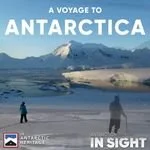We are all Antarctica • We are all Antarctica • We are all Antarctica • We are all Antarctica • We are all Antarctica • We are all Antarctica •
We are all Antarctica • We are all Antarctica • We are all Antarctica • We are all Antarctica • We are all Antarctica • We are all Antarctica •
Explore the Ice Beneath the Surface with the Author


















